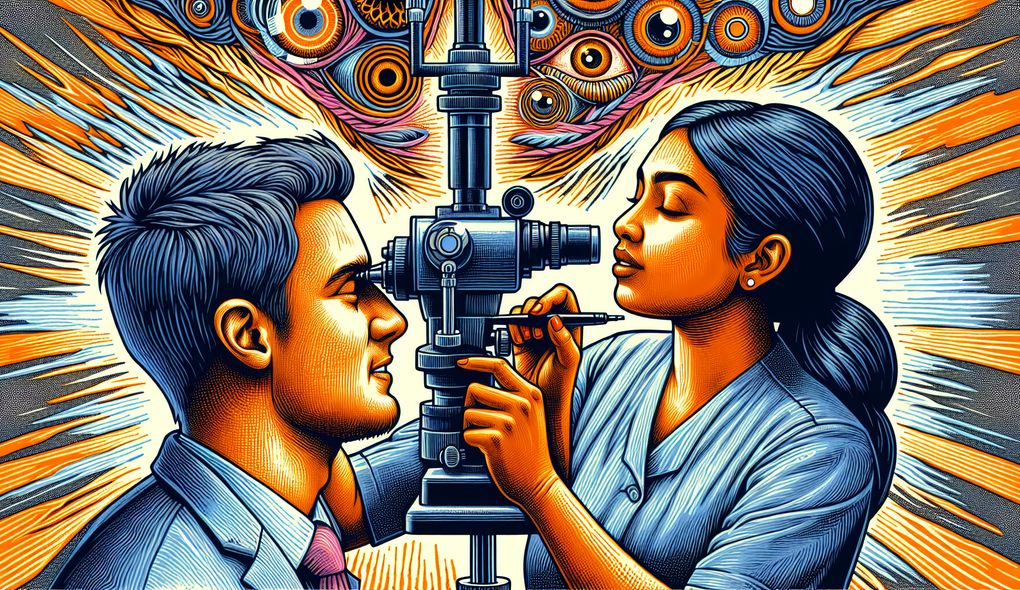Can you give an example of a difficult diagnosis you made and how you approached it?
INTERMEDIATE LEVEL

Sample answer to the question:
Yes, I can give an example of a difficult diagnosis I made. I had a patient who presented with blurry vision and eye pain. After conducting a detailed eye examination, I suspected that it could be a case of uveitis. To confirm my diagnosis, I performed additional tests, including a slit-lamp examination, anterior chamber paracentesis, and an ultrasound scan of the eye. The test results revealed inflammation in the uveal tract, confirming my diagnosis of uveitis. I collaborated with the ophthalmologist to develop a treatment plan, which included prescribing anti-inflammatory medications and close monitoring of the patient's progress. With consistent follow-up appointments and adjustments to the treatment plan, the patient's symptoms gradually improved, and their vision returned to normal.
Here is a more solid answer:
Certainly! Let me share with you an example of a difficult diagnosis I encountered in my practice. I had a patient who came in with complaints of sudden vision loss in one eye. The initial examination showed no apparent abnormalities. However, considering the severity of the symptom, I suspected a potential retinal detachment. To further investigate, I performed a comprehensive dilated fundus examination, which revealed a small retinal tear. I promptly referred the patient to the ophthalmologist for further evaluation and recommended immediate retinal laser surgery to prevent the detachment from progressing. The patient underwent successful surgery and experienced restored vision in their affected eye. In this case, my ability to recognize the urgency of the situation and promptly collaborate with the ophthalmologist played a crucial role in ensuring optimal patient outcomes.
Why is this a more solid answer?
The solid answer goes into more depth by providing specific details about the diagnostic process, including the specific examination performed and the recommendation for immediate retinal laser surgery. It also emphasizes the candidate's ability to recognize the urgency of the situation and collaborate effectively with the ophthalmologist. However, it could still benefit from additional information about the follow-up care provided to the patient.
An example of a exceptional answer:
Absolutely! Let me share a challenging diagnosis I encountered during my practice. I had a patient presenting with blurred vision, eye pain, and redness. The initial assessment indicated possible keratitis, but the symptoms did not fully align. To gain a more accurate understanding, I utilized advanced diagnostic tools such as corneal topography and confocal microscopy to assess the cornea's integrity and identify any abnormalities. Upon further examination, I discovered a foreign body embedded in the cornea, causing inflammation and astigmatism. After informing the patient about the findings, I promptly performed a foreign body removal procedure using precise techniques, ensuring minimal disruption to the cornea. I prescribed appropriate antibiotic eye drops and provided detailed instructions regarding post-procedural care. Through diligent follow-up appointments, I monitored the patient's progress and witnessed a complete resolution of their symptoms, leading to improved visual acuity. This experience highlighted the significance of thorough and specialized assessments in delivering accurate diagnoses and tailored treatment plans.
Why is this an exceptional answer?
The exceptional answer provides a detailed account of the candidate's diagnostic process, including the use of advanced diagnostic tools like corneal topography and confocal microscopy. It also highlights the candidate's expertise in performing a foreign body removal procedure with precision and their emphasis on patient education and follow-up care. The answer demonstrates strong patient assessment and diagnostic skills, as well as a deep understanding of ophthalmic diseases and treatments.
How to prepare for this question:
- Review and familiarize yourself with the different ophthalmic diseases and their clinical presentations.
- Stay updated with the latest advancements in ophthalmic diagnostic tools and techniques.
- Practice discussing specific cases you have encountered, highlighting the complexities and challenges faced.
- Demonstrate the ability to collaborate effectively with ophthalmologists and other healthcare professionals in delivering comprehensive patient care.
What are interviewers evaluating with this question?
- Excellent patient assessment and diagnostic skills
- Strong knowledge of ophthalmic diseases and treatments

